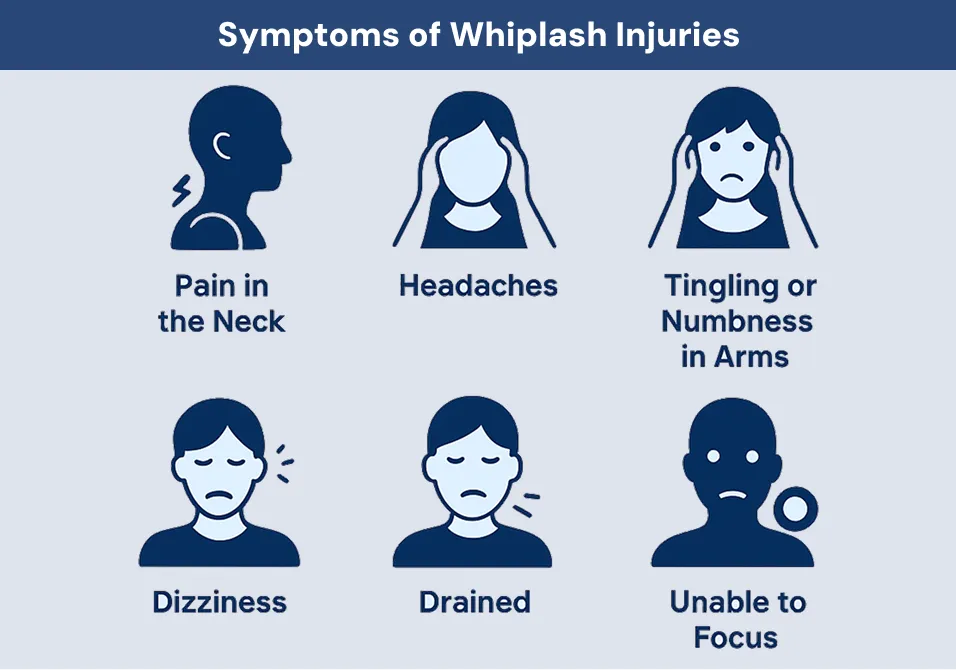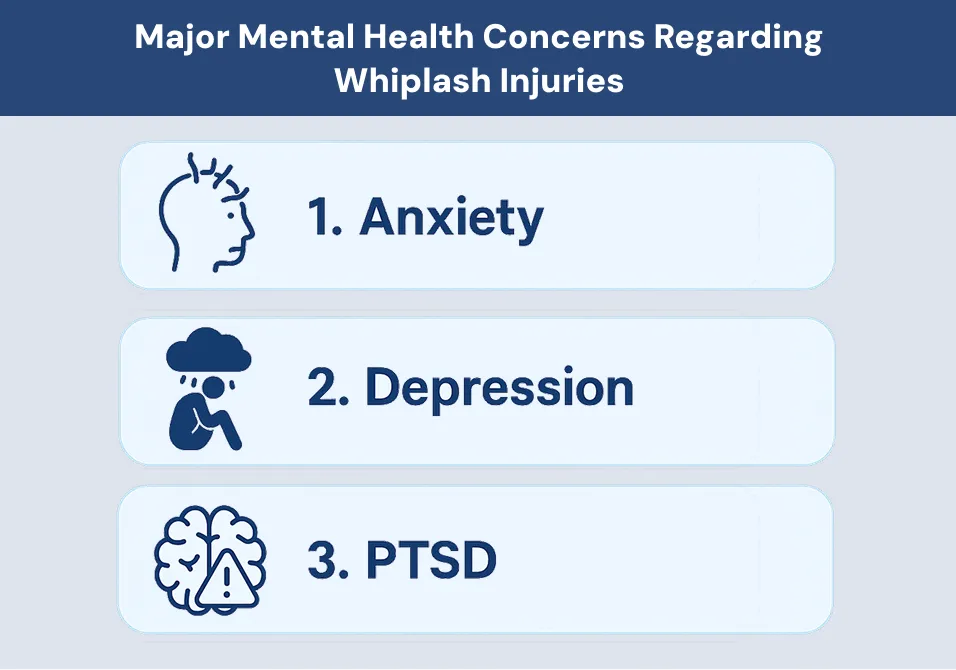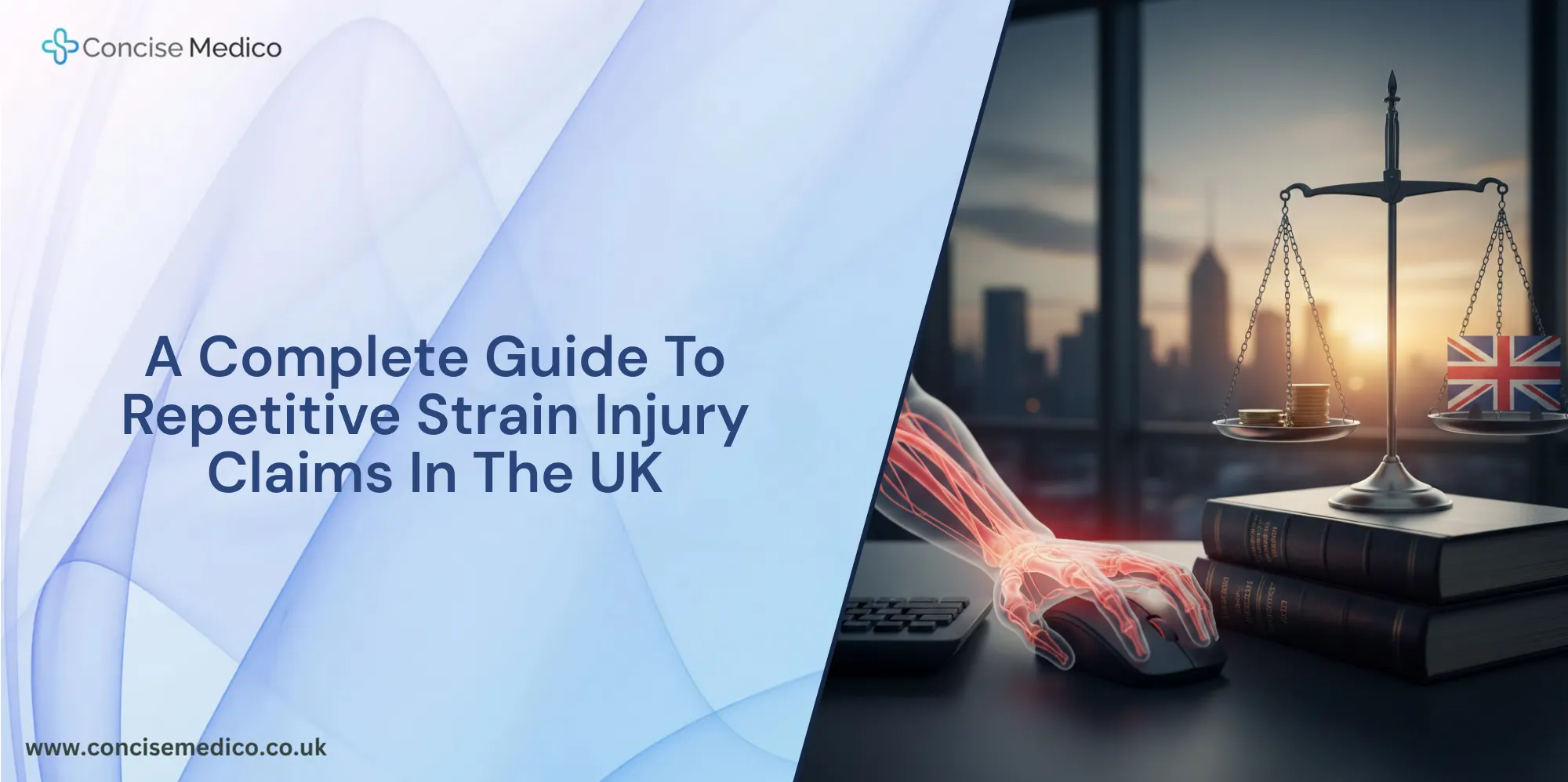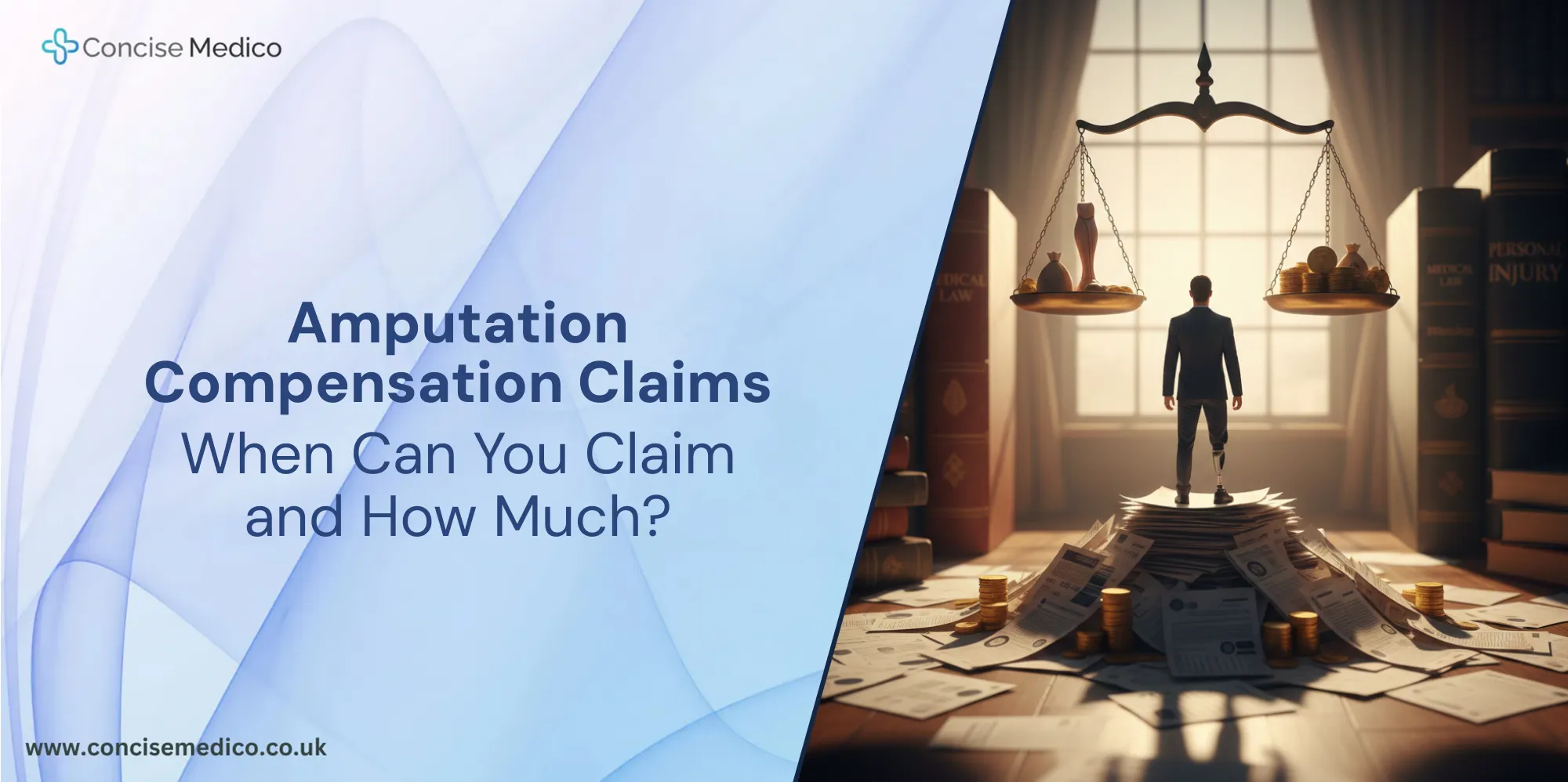TABLE OF CONTENT
- Common Causes of Whiplash Injuries
- Symptoms of Whiplash Injuries
- How Long Does Whiplash Recovery Take?
- Case Study: 32‑Year‑Old Male with Whiplash
- Major Mental Health Concerns Regarding Whiplash Injuries
- How Ergonomics Can Help Prevent Whiplash Injuries
- Living with Chronic Whiplash – How to Recover Fast?
- How Concise Medico Helps You Deal with Whiplash Injuries
- FAQs
In your daily life you might experience some injuries which may occur as your neck moves too suddenly and forcefully. This typically involves the neck snapping back and then forward during a fraction of a second. The act elongates or strains the muscles, tendons and ligaments in your neck. Such injuries are called Whiplash Injuries.
The majority of such injuries in the UK are connected to car crashes. It usually occurs when one vehicle strikes the rear of another one. You can also get whiplash from a fall, a fight or playing contact sports, too.
It’s not always serious, but it can be painful and lead to other problems. Some people have pain immediately. For other people, symptoms may not appear for nearly a few hours. And that’s why information about whiplash injuries can be useful. It lets people take action early and avoid long-term problems.
Common Causes of Whiplash Injuries
There are many causes of whiplash injuries in the UK. These causes include road accidents and everyday activities. The most common cause is a rear-end collision. When your car is hit from behind, your body moves forward, but your head may lag and then snap forward fast. This puts pressure on the neck.
Other common causes include:
- Contact sports like rugby, football, or boxing
- Falls that cause sudden head or neck movement
- Physical assaults involving shaking or forceful hits
- Fast rides at amusement parks
- Cycling accidents with sudden stops or crashes
Even a small accident can cause whiplash injuries. It does not take a major crash for symptoms to appear. This is why it is always good to be careful and seek help in case any pain starts after an incident.
Symptoms of Whiplash Injuries
Not everyone feels whiplash straight away. In fact, many people feel that they’re fine right after the accident. They might be a bit shaken up but nothing much serious. Then, the next morning or even later that day, it hits. A stiff neck.
The symptoms can show up in other ways, not always at once. Some common ones people often notice include:
- A dull or sharp pain in the neck, or just a general tight feeling
- Difficulty turning your head, like it feels stuck or heavier than usual
- Headaches that often start at the back of the skull and just sort of hang around
- Soreness in the shoulders or even the upper back
- Odd sensations in your arms or fingers like tingling or maybe numbness
- Feeling dizzy or kind of spaced out
- A sense of being drained, tired for no obvious reason
- Trouble staying focused or keeping in mind little things
And the thing is, these symptoms don’t always follow a clear pattern. Sometimes they ease up after a few days. While at other times they drag on for a few weeks. And occasionally not super often, but it happens they linger longer than that.
If you’re still feeling off after a few days, or if the pain’s getting worse instead of better, it’s probably time to see your GP. Just to be safe. It’s better to check early than wait it out and end up dealing with something that could’ve been managed sooner.

How Long Does Whiplash Recovery Take?
There is no fixed timeline for recovery. For some people, especially when it’s mild, things start to settle in a week or two maybe three. A bit of rest, some basic pain meds, and slowly starting to move again, and that’s usually enough. Not always, but often.
But then there are the cases that take longer. Not necessarily because something was done wrong, but just because the injury itself goes deeper — more strain on the muscles, more stiffness, maybe even nerve involvement. Those situations don’t bounce back as quickly, and honestly, they need a bit more structure. Like, working with a physiotherapist, getting into a proper routine of stretches or strength-building, and sometimes a few other things depending on what’s going on.
It’s not just about time passing. it’s about how that time is used. Recovery, especially when the injury’s more than just mild, can take patience. What works for one person might not work well for the other.
An article published in Journal of Bone & Joint Surgery (British Volume) stated that:
“Most patients make a full recovery, with over 66 % returning to normal, while approximately 2 % remain permanently disabled. Moreover, around 70 % of recovery outcomes can be predicted within three months.”
Factors Affecting Whiplash Healing
Several things affect how fast someone recovers from whiplash injuries. These include:
- The severity of the injury.
- The person’s age and overall health.
- Whether the person had neck problems before.
- How quickly treatment started.
- The person’s stress levels or mental health.
Whiplash healing improves with early care. Getting a proper diagnosis and treatment plan helps reduce long-term issues. People who stay active within limits often heal better than those who rest too much.
Make yourself more aware by reading about Whiplash Injury To Neck
Case Study: 32‑Year‑Old Male with Whiplash
In a St George’s NHS case report by Dr. A. Krol, a patient, suffered from a road traffic accident. He reported intense right‑sided neck pain around the C4 level, radiating to the base of his neck and right shoulder blade. He also had intermittent mild numbness in his right index finger, though this was not constant.
MRI (2015) revealed C6–C7 disc protrusion mildly compressing the spinal cord and a C3–C4 protrusion. No spinal fractures or significant narrowing were found. The patient went through detailed conservative therapy including, extensive physiotherapy and regular exercise, acupuncture and multiple pain medications.
Major Mental Health Concerns Regarding Whiplash Injuries
Such injuries do not just affect the body. They can affect mental health too. Pain and physical limits can cause stress. Some people feel low or anxious when they cannot do normal tasks.
1. Anxiety
Whiplash anxiety is common. People may fear driving again or feel nervous about getting hurt a second time. They may worry about the pain coming back. This can lead to sleep problems, irritability, and trouble relaxing.
2. Depression
Long-term pain can end up in depression. People may feel tired or hopeless. They might stop socialising or doing activities they enjoy. Pain makes it harder to stay upbeat. Depression often goes untreated in people with chronic pain, but it can be managed with support.
3. PTSD
If the whiplash injuries happen after a sudden car crash or some event of violence, they may lead to PTSD . People may have flashbacks or dreams that make them feel scared in similar events. Talking to a therapist can help.

How Ergonomics Can Help Prevent Whiplash Injuries
Whiplash injuries are not always avoidable. But some can be prevented. Ergonomics helps reduce the risk by improving how people sit and move during work or travel.
Ergonomic Configuration of the Workspace
Many people in the UK work at desks. Poor posture at work can lead to neck strain. If someone already has a weak neck, they are more likely to get whiplash from even small movements. In an article published by Drew G. Bossen, PT, MBA, on office ergonomics and the importance of movement, it is stated that,
“Plain and simple, we perform better when we move. Hence, the notion of static, fixed posture is misguided and problematic. Freedom of movement along with stress‑free movement patterns should be encouraged.”
— Drew G. Bossen
Tips to make your workspace safer:
- Keep your computer screen at eye level
- Use a chair with proper back and neck support
- Sit with feet flat and shoulders relaxed
- Use a headset instead of holding the phone
- Take short breaks every 30 to 60 minutes
These changes help keep the neck in a better position. This further reduces the risk of injuries caused by bad posture.
Get to know the tips and best practices while Sleeping with Whiplash.
Ergonomic Car Setup
Since many whiplash injuries in the UK come from road accidents, setting up your car seat properly is key.
Car setup tips:
- Adjust the headrest to align it with your head.
- Put your back against the seat and sit straight.
- Make sure your seat is close enough so you are not stretching forward.
- Always wear your seatbelt properly.
These small changes can reduce the chance of getting whiplash during an accident. They also improve comfort while driving.
Learn more about it through our guide on Whiplash Car Accident.
Living with Chronic Whiplash – How to Recover Fast?
Sometimes, whiplash pain does not go away quickly. It becomes chronic. This can affect work, relationships, and overall wellbeing. Chronic whiplash needs extra care and patience.
Here are a few things that might help speed up recovery or at least make it more manageable:
- Try to stay gently active as it keeps things from stiffening too much
- If possible, work with a physio as they usually guide better movement, not too much, not too little
- Use heat or cold and that depends on the day
- A good pillow matters more than it sounds as proper neck support can ease mornings
- If stress starts piling up, speak to someone. Mental health support is actually the part of recovery.
- Simple breathing or mindfulness can help calm things down a bit mainly on harder days
Chronic pain’s tough, but even small wins add up over time. Try to notice what helps and what doesn’t. Recovery won’t always be fast, but it happens and support from doctors, physios, or therapists really does help Asking for help? That’s not a weakness. It’s part of how people get through this
Get an insight into Whiplash Injury Treatment and Diagnosis: What to Expect.
How Concise Medico Helps You Deal with Whiplash Injuries
Whiplash injuries affect more people in the UK than most realise. Many come from car accidents, but other causes like falls or sports are also common. Symptoms do not always show up right away, and recovery time varies.
Some people heal fast. Others need months of care. Whiplash can affect mental health too. That is why full recovery includes both body and mind. Making smart choices at work and while driving can help prevent injury. And if pain is still there, it is important to get help. There is more strength in getting the needed support.
These injuries may not look serious on the outside. But they affect daily life. At Concise Medico, we provide the right care. Our experts ensure that our clients recover and get back to their normal lives. The key is listening to your body and getting help early.
FAQs
In your daily life you might experience some injuries which may occur as your neck moves too suddenly and forcefully. This typically involves the neck snapping back and then forward during a fraction of a second. The act elongates or strains the muscles, tendons and ligaments in your neck. Such injuries are called Whiplash Injuries.
The majority of such injuries in the UK are connected to car crashes. It usually occurs when one vehicle strikes the rear of another one. You can also get whiplash from a fall, a fight or playing contact sports, too.
It’s not always serious, but it can be painful and lead to other problems. Some people have pain immediately. For other people, symptoms may not appear for nearly a few hours. And that’s why information about whiplash injuries can be useful. It lets people take action early and avoid long-term problems.
Common Causes of Whiplash Injuries
There are many causes of whiplash injuries in the UK. These causes include road accidents and everyday activities. The most common cause is a rear-end collision. When your car is hit from behind, your body moves forward, but your head may lag and then snap forward fast. This puts pressure on the neck.
Other common causes include:
- Contact sports like rugby, football, or boxing
- Falls that cause sudden head or neck movement
- Physical assaults involving shaking or forceful hits
- Fast rides at amusement parks
- Cycling accidents with sudden stops or crashes
Even a small accident can cause whiplash injuries. It does not take a major crash for symptoms to appear. This is why it is always good to be careful and seek help in case any pain starts after an incident.
Symptoms of Whiplash Injuries
Not everyone feels whiplash straight away. In fact, many people feel that they’re fine right after the accident. They might be a bit shaken up but nothing much serious. Then, the next morning or even later that day, it hits. A stiff neck.
The symptoms can show up in other ways, not always at once. Some common ones people often notice include:
- A dull or sharp pain in the neck, or just a general tight feeling
- Difficulty turning your head, like it feels stuck or heavier than usual
- Headaches that often start at the back of the skull and just sort of hang around
- Soreness in the shoulders or even the upper back
- Odd sensations in your arms or fingers like tingling or maybe numbness
- Feeling dizzy or kind of spaced out
- A sense of being drained, tired for no obvious reason
- Trouble staying focused or keeping in mind little things
And the thing is, these symptoms don’t always follow a clear pattern. Sometimes they ease up after a few days. While at other times they drag on for a few weeks. And occasionally not super often, but it happens they linger longer than that.
If you’re still feeling off after a few days, or if the pain’s getting worse instead of better, it’s probably time to see your GP. Just to be safe. It’s better to check early than wait it out and end up dealing with something that could’ve been managed sooner.

How Long Does Whiplash Recovery Take?
There is no fixed timeline for recovery. For some people, especially when it’s mild, things start to settle in a week or two maybe three. A bit of rest, some basic pain meds, and slowly starting to move again, and that’s usually enough. Not always, but often.
But then there are the cases that take longer. Not necessarily because something was done wrong, but just because the injury itself goes deeper — more strain on the muscles, more stiffness, maybe even nerve involvement. Those situations don’t bounce back as quickly, and honestly, they need a bit more structure. Like, working with a physiotherapist, getting into a proper routine of stretches or strength-building, and sometimes a few other things depending on what’s going on.
It’s not just about time passing. it’s about how that time is used. Recovery, especially when the injury’s more than just mild, can take patience. What works for one person might not work well for the other.
An article published in Journal of Bone & Joint Surgery (British Volume) stated that:
“Most patients make a full recovery, with over 66 % returning to normal, while approximately 2 % remain permanently disabled. Moreover, around 70 % of recovery outcomes can be predicted within three months.”
Factors Affecting Whiplash Healing
Several things affect how fast someone recovers from whiplash injuries. These include:
- The severity of the injury.
- The person’s age and overall health.
- Whether the person had neck problems before.
- How quickly treatment started.
- The person’s stress levels or mental health.
Whiplash healing improves with early care. Getting a proper diagnosis and treatment plan helps reduce long-term issues. People who stay active within limits often heal better than those who rest too much.
Make yourself more aware by reading about Whiplash Injury To Neck
Case Study: 32‑Year‑Old Male with Whiplash
In a St George’s NHS case report by Dr. A. Krol, a patient, suffered from a road traffic accident. He reported intense right‑sided neck pain around the C4 level, radiating to the base of his neck and right shoulder blade. He also had intermittent mild numbness in his right index finger, though this was not constant.
MRI (2015) revealed C6–C7 disc protrusion mildly compressing the spinal cord and a C3–C4 protrusion. No spinal fractures or significant narrowing were found. The patient went through detailed conservative therapy including, extensive physiotherapy and regular exercise, acupuncture and multiple pain medications.
Major Mental Health Concerns Regarding Whiplash Injuries
Such injuries do not just affect the body. They can affect mental health too. Pain and physical limits can cause stress. Some people feel low or anxious when they cannot do normal tasks.
1. Anxiety
Whiplash anxiety is common. People may fear driving again or feel nervous about getting hurt a second time. They may worry about the pain coming back. This can lead to sleep problems, irritability, and trouble relaxing.
2. Depression
Long-term pain can end up in depression. People may feel tired or hopeless. They might stop socialising or doing activities they enjoy. Pain makes it harder to stay upbeat. Depression often goes untreated in people with chronic pain, but it can be managed with support.
3. PTSD
If the whiplash injuries happen after a sudden car crash or some event of violence, they may lead to PTSD . People may have flashbacks or dreams that make them feel scared in similar events. Talking to a therapist can help.

How Ergonomics Can Help Prevent Whiplash Injuries
Whiplash injuries are not always avoidable. But some can be prevented. Ergonomics helps reduce the risk by improving how people sit and move during work or travel.
Ergonomic Configuration of the Workspace
Many people in the UK work at desks. Poor posture at work can lead to neck strain. If someone already has a weak neck, they are more likely to get whiplash from even small movements. In an article published by Drew G. Bossen, PT, MBA, on office ergonomics and the importance of movement, it is stated that,
“Plain and simple, we perform better when we move. Hence, the notion of static, fixed posture is misguided and problematic. Freedom of movement along with stress‑free movement patterns should be encouraged.”
— Drew G. Bossen
Tips to make your workspace safer:
- Keep your computer screen at eye level
- Use a chair with proper back and neck support
- Sit with feet flat and shoulders relaxed
- Use a headset instead of holding the phone
- Take short breaks every 30 to 60 minutes
These changes help keep the neck in a better position. This further reduces the risk of injuries caused by bad posture.
Get to know the tips and best practices while Sleeping with Whiplash.
Ergonomic Car Setup
Since many whiplash injuries in the UK come from road accidents, setting up your car seat properly is key.
Car setup tips:
- Adjust the headrest to align it with your head.
- Put your back against the seat and sit straight.
- Make sure your seat is close enough so you are not stretching forward.
- Always wear your seatbelt properly.
These small changes can reduce the chance of getting whiplash during an accident. They also improve comfort while driving.
Learn more about it through our guide on Whiplash Car Accident.
Living with Chronic Whiplash – How to Recover Fast?
Sometimes, whiplash pain does not go away quickly. It becomes chronic. This can affect work, relationships, and overall wellbeing. Chronic whiplash needs extra care and patience.
Here are a few things that might help speed up recovery or at least make it more manageable:
- Try to stay gently active as it keeps things from stiffening too much
- If possible, work with a physio as they usually guide better movement, not too much, not too little
- Use heat or cold and that depends on the day
- A good pillow matters more than it sounds as proper neck support can ease mornings
- If stress starts piling up, speak to someone. Mental health support is actually the part of recovery.
- Simple breathing or mindfulness can help calm things down a bit mainly on harder days
Chronic pain’s tough, but even small wins add up over time. Try to notice what helps and what doesn’t. Recovery won’t always be fast, but it happens and support from doctors, physios, or therapists really does help Asking for help? That’s not a weakness. It’s part of how people get through this
Get an insight into Whiplash Injury Treatment and Diagnosis: What to Expect.
How Concise Medico Helps You Deal with Whiplash Injuries
Whiplash injuries affect more people in the UK than most realise. Many come from car accidents, but other causes like falls or sports are also common. Symptoms do not always show up right away, and recovery time varies.
Some people heal fast. Others need months of care. Whiplash can affect mental health too. That is why full recovery includes both body and mind. Making smart choices at work and while driving can help prevent injury. And if pain is still there, it is important to get help. There is more strength in getting the needed support.
These injuries may not look serious on the outside. But they affect daily life. At Concise Medico, we provide the right care. Our experts ensure that our clients recover and get back to their normal lives. The key is listening to your body and getting help early.




